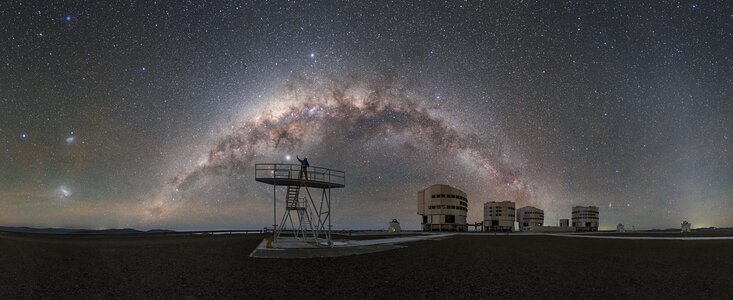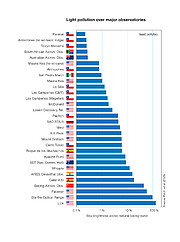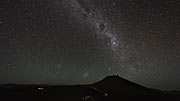Comunicato Stampa
A rischio i cieli più bui e più limpidi del mondo a causa di un megaprogetto industriale
10 Gennaio 2025
Il 24 dicembre, AES Andes, una sussidiaria della società elettrica statunitense AES Corporation, ha presentato il progetto di un enorme complesso industriale per la valutazione dell'impatto ambientale. Questo complesso minaccia i cieli incontaminati sopra l'Osservatorio Paranal dell'ESO nel deserto di Atacama in Cile, il più buio e limpido di tutti gli osservatori astronomici al mondo [1]. Il megaprogetto industriale dovrebbe essere installato a soli 5-11 chilometri dai telescopi di Paranal, il che causerebbe danni irreparabili alle osservazioni astronomiche, in particolare a causa dell'inquinamento luminoso emesso durante il periodo di funzionamento del progetto. Il ricollocamento del complesso salverebbe uno degli ultimi cieli oscuri veramente incontaminati della Terra.
Un patrimonio insostituibile per l'umanità
Dalla sua inaugurazione nel 1999, l'Osservatorio del Paranal, costruito e gestito dall'ESO (Osservatorio Europeo Australe), ha portato a importanti scoperte astronomiche, come la prima immagine di un esopianeta e la conferma dell'espansione accelerata dell'Universo. Il premio Nobel per la fisica nel 2020 è stato assegnato per la ricerca sul buco nero supermassiccio al centro della Via Lattea, in cui sono stati determinanti i telescopi del Paranal. L'osservatorio è una risorsa fondamentale per gli astronomi di tutto il mondo, compreso il Cile che ha visto la comunità astronomica crescere notevolmente negli ultimi decenni. Inoltre, il vicino Cerro Armazones ospita la costruzione dell'ELT (Extremely Large Telescope) dell'ESO, il più grande telescopio al mondo nel suo genere, una struttura rivoluzionaria che cambierà radicalmente ciò che sappiamo dell'Universo.
"La vicinanza del megaprogetto industriale AES Andes al Paranal rappresenta un rischio critico per i cieli notturni più incontaminati del pianeta", ha sottolineato il Direttore Generale dell'ESO, Xavier Barcons. "Le emissioni di polvere durante la costruzione, l'aumento della turbolenza atmosferica e, in particolare, l'inquinamento luminoso avranno un impatto irreparabile sulle capacità di osservazione astronomica, che finora hanno attirato investimenti multimiliardari da parte dei governi degli Stati membri dell'ESO".
L'impatto senza precedenti di un megaprogetto
Il progetto comprende un complesso industriale di oltre 3000 ettari, pari alle dimensioni di una città o di un sobborgo, come Valparaiso, in Cile o Garching, vicino a Monaco, in Germania. Include la costruzione di un porto, impianti di produzione di ammoniaca e idrogeno e migliaia di gruppi di produzione di elettricità vicino al Paranal.
Grazie alla stabilità atmosferica e alla mancanza di inquinamento luminoso, il deserto di Atacama è un laboratorio naturale unico per la ricerca astronomica. Questi attributi sono essenziali per i progetti scientifici che mirano ad affrontare questioni fondamentali, come l'origine e l'evoluzione dell'Universo o la ricerca della vita e dell'abitabilità di altri pianeti.
Un appello per proteggere i cieli cileni
"Il Cile, e in particolare il Paranal, è un posto davvero speciale per l'astronomia: i suoi cieli bui sono un patrimonio naturale che trascende i confini e porta benefici a tutta l'umanità", afferma Itziar de Gregorio, rappresentante dell'ESO in Cile. "È fondamentale considerare sedi alternative per questo megaprogetto che non mettano in pericolo uno dei tesori astronomici più importanti al mondo".
Il ricollocamento di questo progetto rimane l'unico modo efficace per prevenire danni irreversibili ai cieli unici del Paranal. Questa misura non solo salvaguarderà il futuro dell'astronomia, ma preserverà anche uno degli ultimi cieli bui veramente incontaminati sulla Terra.
Note
[1] Uno studio di Falchi e collaboratori, pubblicato nel 2023 su Monthly Notices of the Royal Astronomical Society, ha confrontato l'inquinamento luminoso in tutti i 28 principali osservatori astronomici, trovando che il Paranal è il sito più buio tra tutti.
Ulteriori Informazioni
L'ESO (European Southern Observatory o Osservatorio Europeo Australe) consente agli scienziati di tutto il mondo di scoprire i segreti dell'Universo a beneficio di tutti. Progettiamo, costruiamo e gestiamo da terra osservatori di livello mondiale - che gli astronomi utilizzano per affrontare temi interessanti e diffondere il fascino dell'astronomia - e promuoviamo la collaborazione internazionale per l'astronomia. Fondato come organizzazione intergovernativa nel 1962, oggi l'ESO è sostenuto da 16 Stati membri (Austria, Belgio, Danimarca, Francia, Finlandia, Germania, Irlanda, Italia, Paesi Bassi, Polonia, Portogallo, Regno Unito, Repubblica Ceca, Spagna, Svezia e Svizzera), insieme con il paese che ospita l'ESO, il Cile, e l'Australia come partner strategico. Il quartier generale dell'ESO e il Planetario e Centro Visite Supernova dell'ESO si trovano vicino a Monaco, in Germania, mentre il deserto cileno di Atacama, un luogo meraviglioso con condizioni uniche per osservare il cielo, ospita i nostri telescopi. L'ESO gestisce tre siti osservativi: La Silla, Paranal e Chajnantor. Sul Paranal, l’ESO gestisce il VLT (Very Large Telescope) e il VLTI (Very Large Telescope Interferometer), così come telescopi per survey come VISTA. Sempre a Paranal l'ESO ospiterà e gestirà la schiera meridionale di telescopi di CTA, il Cherenkov Telescope Array Sud, il più grande e sensibile osservatorio di raggi gamma del mondo. Insieme con partner internazionali, l’ESO gestisce APEX e ALMA a Chajnantor, due strutture che osservano il cielo nella banda millimetrica e submillimetrica. A Cerro Armazones, vicino a Paranal, stiamo costruendo "il più grande occhio del mondo rivolto al cielo" - l'ELT (Extremely Large Telescope, che significa Telescopio Estremamente Grande) dell'ESO. Dai nostri uffici di Santiago, in Cile, sosteniamo le operazioni nel paese e collaboriamo con i nostri partner e la società cileni.
La traduzione dall'inglese dei comunicati stampa dell'ESO è un servizio dalla Rete di Divulgazione Scientifica dell'ESO (ESON: ESO Science Outreach Network) composta da ricercatori e divulgatori scientifici da tutti gli Stati Membri dell'ESO e altri paesi. Il nodo italiano della rete ESON è gestito da Anna Wolter.
Contatti
Francisco Rodríguez
ESO Media Relations Officer
Santiago, Chile
Tel.: +56 2 2463 3151
E-mail: francisco.rodriguez@eso.org
Bárbara Ferreira
ESO Media Manager
Garching bei München, Germany
Tel.: +49 89 3200 6670
E-mail: press@eso.org
Anna Wolter (press contact Italia)
Rete di divulgazione scientifica dell'ESO
e INAF-Osservatorio Astronomico di Brera
Milano, Italy
Tel.: +39 02 72320321
E-mail: eson-italy@eso.org
Sul Comunicato Stampa
| Comunicato Stampa N": | eso2501it |
| Nome: | Cerro Paranal, European Southern Observatory, Paranal |
| Tipo: | Unspecified : Technology : Observatory |
| Facility: | Very Large Telescope |
Our use of Cookies
We use cookies that are essential for accessing our websites and using our services. We also use cookies to analyse, measure and improve our websites’ performance, to enable content sharing via social media and to display media content hosted on third-party platforms.
ESO Cookies Policy
The European Organisation for Astronomical Research in the Southern Hemisphere (ESO) is the pre-eminent intergovernmental science and technology organisation in astronomy. It carries out an ambitious programme focused on the design, construction and operation of powerful ground-based observing facilities for astronomy.
This Cookies Policy is intended to provide clarity by outlining the cookies used on the ESO public websites, their functions, the options you have for controlling them, and the ways you can contact us for additional details.
What are cookies?
Cookies are small pieces of data stored on your device by websites you visit. They serve various purposes, such as remembering login credentials and preferences and enhance your browsing experience.
Categories of cookies we use
Essential cookies (always active): These cookies are strictly necessary for the proper functioning of our website. Without these cookies, the website cannot operate correctly, and certain services, such as logging in or accessing secure areas, may not be available; because they are essential for the website’s operation, they cannot be disabled.
Functional Cookies: These cookies enhance your browsing experience by enabling additional features and personalization, such as remembering your preferences and settings. While not strictly necessary for the website to function, they improve usability and convenience; these cookies are only placed if you provide your consent.
Analytics cookies: These cookies collect information about how visitors interact with our website, such as which pages are visited most often and how users navigate the site. This data helps us improve website performance, optimize content, and enhance the user experience; these cookies are only placed if you provide your consent. We use the following analytics cookies.
Matomo Cookies:
This website uses Matomo (formerly Piwik), an open source software which enables the statistical analysis of website visits. Matomo uses cookies (text files) which are saved on your computer and which allow us to analyze how you use our website. The website user information generated by the cookies will only be saved on the servers of our IT Department. We use this information to analyze www.eso.org visits and to prepare reports on website activities. These data will not be disclosed to third parties.
On behalf of ESO, Matomo will use this information for the purpose of evaluating your use of the website, compiling reports on website activity and providing other services relating to website activity and internet usage.
Matomo cookies settings:
Additional Third-party cookies on ESO websites: some of our pages display content from external providers, e.g. YouTube.
Such third-party services are outside of ESO control and may, at any time, change their terms of service, use of cookies, etc.
YouTube: Some videos on the ESO website are embedded from ESO’s official YouTube channel. We have enabled YouTube’s privacy-enhanced mode, meaning that no cookies are set unless the user actively clicks on the video to play it. Additionally, in this mode, YouTube does not store any personally identifiable cookie data for embedded video playbacks. For more details, please refer to YouTube’s embedding videos information page.
Cookies can also be classified based on the following elements.
Regarding the domain, there are:
- First-party cookies, set by the website you are currently visiting. They are stored by the same domain that you are browsing and are used to enhance your experience on that site;
- Third-party cookies, set by a domain other than the one you are currently visiting.
As for their duration, cookies can be:
- Browser-session cookies, which are deleted when the user closes the browser;
- Stored cookies, which stay on the user's device for a predetermined period of time.
How to manage cookies
Cookie settings: You can modify your cookie choices for the ESO webpages at any time by clicking on the link Cookie settings at the bottom of any page.
In your browser: If you wish to delete cookies or instruct your browser to delete or block cookies by default, please visit the help pages of your browser:
Please be aware that if you delete or decline cookies, certain functionalities of our website may be not be available and your browsing experience may be affected.
You can set most browsers to prevent any cookies being placed on your device, but you may then have to manually adjust some preferences every time you visit a site/page. And some services and functionalities may not work properly at all (e.g. profile logging-in, shop check out).
Updates to the ESO Cookies Policy
The ESO Cookies Policy may be subject to future updates, which will be made available on this page.
Additional information
For any queries related to cookies, please contact: pdprATesoDOTorg.
As ESO public webpages are managed by our Department of Communication, your questions will be dealt with the support of the said Department.



